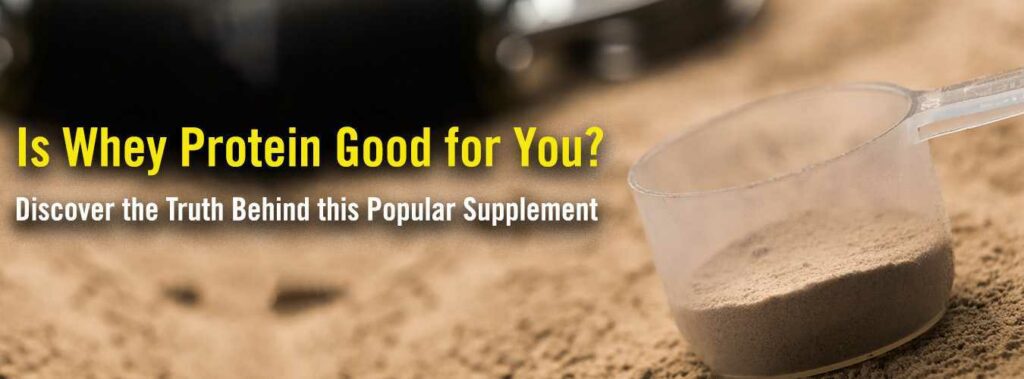Is Whey Protein Good for You? Discover the Truth Behind this Popular Supplement
16 December 2019
Whey protein is the most widely accepted protein supplement worldwide. Many fitness enthusiasts and sports persons take this supplement to enhance muscle building. But is whey protein really good for your body? Read this article and find out.
Whey protein is a supplement popular for its muscle-building properties. But there is much more to whey protein than just muscle building. There is a hot debate on the benefits and possible side effects of whey protein. Whether this highly-researched protein supplement is good for you or not, read the post to understand.
The market is flooded with various types of protein supplements. Whether you are allergic to milk or lactose, vegan or belong to any other category; there is a protein supplement present in the market for everyone, which claims to give you the best results.
Is Whey Protein What You Really Need?
You might already be aware of the fact that whey helps in muscle building. But, you might not be informed about the other non-muscle benefits of whey protein powder. Weight loss, improving immune system function, enhancing cardiovascular health, helping with Type 2 diabetes, etc. are a few other benefits of whey protein. All this is because of a few peptides and the amount of protein found in whey supplements.
A Quick Intro to Whey Protein
Whey is a milk protein that is derived from cow’s milk mostly but can also be derived from goat or sheep’s milk sometimes. Milk has 2 types of proteins: whey, and casein. Whey in milk is just 20% whereas casein is 80%.
When milk is processed while making cheese, the liquid left behind is whey and you also obtain casein in solid form. Whey goes for further processing and filtration and is made into whey protein concentrate and whey protein isolate mostly.
Digestibility of Whey
Whey protein is known for its easy digestibility as compared to other forms of protein. Though for some people it might be difficult to digest it. These people fall under the category of lactose intolerance or those who are allergic to milk and dairy products. People who have low tolerance towards lactose is mainly due to two compounds found in milk: Lactose and Casein.
Lactose is the natural milk sugar which many people face issue digesting. It leads to symptoms like bloating, nausea, cramping, etc. Casein is a milk protein that can give symptoms like gas and stomach pain in lactose-intolerant people.
The Amino Acid Story
Just like any other proteins, whey protein too contains amino acids. Amino acids act as the building blocks for the formation of all protein molecules and are also the key determinant in structuring your tissues, inclusive of the muscles, hair, skin, and nails.
Whey protein comprises of all the essential amino acids and also BCAA (Branched-chain amino acids) which help in muscle building. The reason why you need these ‘essential amino acids’ is because your body is not capable of producing them on its own. Around 35% of the protein in your muscle tissue is BCAA. These are widely known for their anabolic effects.
There are 3 main types of BCAAs: leucine, isoleucine, and valine. All 3 are crucial for muscle building but leucine out of these 3 is the most important one as it aids in muscle protein synthesis. Whey protein is highly rich in leucine.
Muscle Growth and Recovery & Whey
Amino acid circulation is required in the blood to build and repair your muscles. For this to happen, you need protein in a sufficient amount. We have explained how whey is so digestible and a good source of quality protein. The way whey helps in muscle building is by promoting positive overall protein balance in your muscle tissues.
Your overall net protein balance is equal to the protein synthesis minus your muscle breakdown. So put to it in simpler terms, your muscle mass will grow when the muscle synthesis overpowers muscle degeneration.
The Connection to Weight Loss and Development of Lean Muscle Mass
The ideal way to lose weight is to shed the body fat while attaining lean muscle mass. Lowering the intake of carbs and replacing the same amount with protein and fats is going to help you lose weight. You should also keep a check on your daily calorie intake. The type of protein supplement that you consume while trying to lose weight matters a lot.
Why whey can be the best choice for you- simply because it is rich in amino acids and BCAAs like leucine which helps in maintaining muscle mass. Also, it is more digestible as compared to other proteins.
Metabolic Disorders and Whey Protein
Whey protein helps in maintaining lean muscle mass while you are losing weight. This indicates a positive spike in metabolism. Whey protein positively affects metabolism, especially in those who are dealing with metabolic issues or issues like Type 2 diabetes and obesity.
Obesity and diabetes are metabolic disorders that arise due to troubles with insulin. A constantly high blood glucose level is responsible for insulin problems. Various researches have shown that taking whey protein supplements has improved fasting insulin levels in people with obesity. Some researches also state that people dealing with Type 2 diabetes showed better post-meal glucose and insulin responses when they consumed whey protein before having a high-carb breakfast.
A Ray of Hope for Chronic Diseases
There are various researches that show that whey protein can prove to be helpful in the following mentioned chronic diseases:
- Cancer: Some studies conducted to find out the effects of whey protein on cancer patients. The cysteine present in whey protein can help in minimizing the formation of tumors in the human body. The presence of lactoferrin suppresses the growth of colon cancer cells.
- Cardiovascular diseases: People suffering from high blood pressure can be benefitted from whey protein supplements as they help in lowering blood pressure, improving the lipid profile and blood vessel function.
- Gastrointestinal issues: In some studies, it was discovered that people suffering from Crohn’s disease can expect to have lower intestinal permeability or leaky gut when consuming whey protein on a regular basis.
- Liver diseases: In a few studies conducted to find out the effects of whey protein on liver diseases, it was found that taking whey protein improved indicators of non-alcoholic fatty liver disease in women with obesity.
Does Whey Protein has Any Side Effects?
Well, while most of the people face no issues with whey protein as it is highly digestible, people having a dairy allergy or lactose intolerance might face issues with whey protein consumption. There are various rumors about whey protein saying that it is harmful to kidneys. But the reality is that protein consumption can be of a bit trouble to you only if you have a pre-existing kidney condition. Whey protein causes no harm to individuals with a healthy kidney and liver.
In a nutshell, whey protein is beneficial for almost everyone and helps you build muscles, have healthy gains and weight loss along with enhancing lean muscle mass, muscle recovery, and muscle protein synthesis.
Still in doubt over why protein? Try MuscleBlaze Biozyme Whey. Its specially designed keeping in mind Indian dietary habits.
Why Indian dietary habits focused while crafting MuscleBlaze Biozyme Whey?
The Indian diet is highly protein deficient and is full of carbs and fats. This makes our bodies less adaptive to protein and we face digestive issues. Not many people in India face the issue of lactose intolerance but due to the diet they consume on a regular basis, digestion of protein becomes a problem for them. MuscleBlaze Biozyme Whey crafted to put an end to India’s protein problem. It gives you 50% more protein absorption and 60% higher BCAA absorption.









 100% Safe & Secure payments:
100% Safe & Secure payments:




